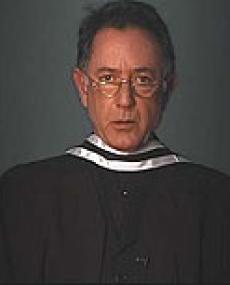
"First of all, I don't take art particularly seriously. I make the work because I enjoy making it. No more complicated reason than that. I like the seriousness of the game."
Malcolm Payne majored in printing and printmaking at the Tshwane University of Technology (TUT). He then followed his studies in sculpture and mixed media at St Martins School of Art in London, and in painting at The University of Cape Town (UCT).
Payne works with a broad array of media, ranging from plastics, metals, or trinkets of everyday life. These include televisions or trade-union logos to make paintings, drawings, or sculptures. His interest is in “utilising images and codes that relate to the experience of living in South Africa today.”
The diverse media that he uses gain meaning and become “the vehicle through which Payne comments on some aspect of society, whether this be racism, the exploitation of labour, the oddness and lingering potency of old monuments, the greed of international pharmaceutical companies who refuse to sell drugs at reasonable prices, the difficulties of reconstructing the "truth" of past events, or the folly of believing any particular doctrine.
Payne has attained status as an influential South African artist, and has won several awards. These include First Prize at New Signatures Competition of the South African Association of Arts in Pretoria in 1968; the Ernest Oppenheimer Memorial Trust Award and the South African Biennale, Art South Africa””Today in Durban in 1997. Payne was also elected as Standard Bank Young Artist of the Year Award Show in 1984.
In 1999, the work Payne did in the 1970’s was chosen for the exhibition Global Conceptualism: Points of Origin 1950s-1980s at Queens Museum, New York and Walker Art Center, USA. He was also chosen as a representative of pioneering the movement of Conceptualism in South Africa.
This was not the first time he had represented South Africa as in 1995, he participated with a solo exhibition at the Venice Biennale. Payne also exhibited a video of the compilation of his work between 1994 and 2002 at the 2nd Johannesburg Biennale. He explains this period in his life:
“”¦ my work from 1987 to 1994 was preoccupied with notions of post-coloniality and meaning”¦ much of my work centrally concerns displacing stereotypical readings of Africa, and "culture" as an ideological construction. The primary theme running through all my work over the years has been "identity". This is understandable living in South Africa through apartheid and its devastating racial policy, which now has come to an end. "
Payne exhibited his work in 1996 with the exhibition “Faultlines” at The Castle in Cape Town. He also participated at the 16th World Wide Video Festival in Stedelijk Museum, Amsterdam in 1998. He then completed a series of large digital prints entitled “Illuminated Manuscripts”. These were exhibited between 2003 and 2005.
Recently, Payne has turned to work more exclusively in video. In 2001, he presented a documentary in the form of an infomercial that examines the dilemma of respecting intellectual property rights over supplying affordable medication for pandemics such as HIV/AIDS. He also participated at the South African artists on the Worldwide Video Festival in Amsterdam, Michaelis School of Fine Art in Cape Town in 2002.
Malcolm Payne is now a professor at the Michaelis School of Fine Art at the University of Cape Town, the city in which he now lives and works.

Figure 1: Gorilla, 1985.
Source: artthrob.co.za

Figure 2: Colour Test. 1974. Screenpoint.
Source: artthrob.co.za